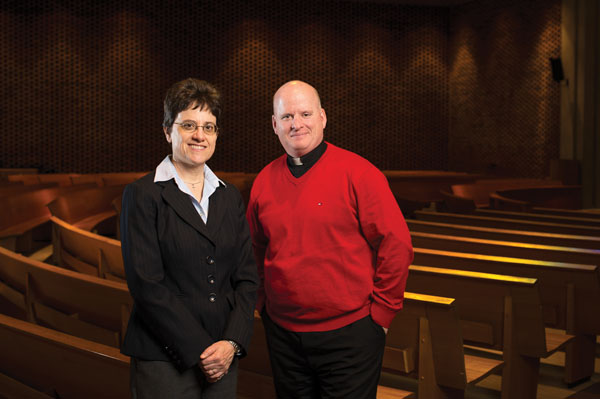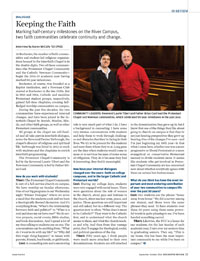In Review
 COMMUNITY LEADERS: Reverend Laurie Tiberi and Father Brian Cool lead the Protestant Chapel and Newman communities, which celebrated
50-year milestones in the past year. (Photo: Adam Fenster)
COMMUNITY LEADERS: Reverend Laurie Tiberi and Father Brian Cool lead the Protestant Chapel and Newman communities, which celebrated
50-year milestones in the past year. (Photo: Adam Fenster)At Rochester, the number of faith communities and student-led religious organizations housed in the Interfaith Chapel is in the double digits. Two of those communities—the Protestant Chapel Community and the Catholic Newman Community—begin the 2014–15 academic year having marked 50-year milestones.
Rochester, of course, was founded as a Baptist institution, and a Newman Club started at Rochester in the late 1920s. But in 1963 and 1964, Catholic and mainline Protestant student groups, respectively, gained full-time chaplains, creating full-fledged worship communities on campus. During the past
five decades, the two communities have experienced internal changes, and have been joined in the Interfaith Chapel by Jewish, Muslim, Hindu, and other faith groups, as well as other Protestant communities. All groups at the chapel are self-funded and all take part in interfaith dialogue, notes the Reverend Denise Yarbrough, the chapel’s director of religious and spiritual life. Yarbrough was hired in 2012 to work with students and the chaplains to enrich interfaith programming.
The Protestant Chapel Community is led by the Reverend Laurie Tiberi and the Newman Community is led by Father Brian Cool.
How do you work with students?
Tiberi: The Protestant Chapel Community is sort of a full-service church on campus. We have worship on Sunday afternoons. One of our big programs is our Wednesday night “Dinner Dialogue,” where we serve a meal that the students cook and we have a theologically themed discussion. And it’s everything from, “What’s the relationship between faith and politics?” to “What is a soul and does my cat have one?” We do service projects, social events, Bible studies, and book discussions. And I spend a lot of my time talking to students one on one. The conversations can be anything from, “What do I want to do with my life?” to “Why did this tragic thing happen?,” to issues with parents, friends, boyfriends, or girlfriends.
Cool: A counseling role and a mentoring role is very much part of what I do. I have a background in counseling. I have some very intense conversations with students and help them to work through challenges and obstacles that they’re facing in their lives. We try to be present for the students and meet them where they’re at. Long gone are the days when students would come to mass or to services because of some sense of obligation. They do it because they find it interesting, they find it meaningful.
How have your internal dialogues changed over the years—both on college campuses, and in the larger Catholic and Protestant worlds?
Cool: During my college days, students were very engaged with social issues. There were questions about the role of women in the church, about gays and lesbians in the church, about nuclear arms, peace, and justice.
Those questions are still important and still asked, but in a different way. The question now is often, “What does it mean to be Catholic?” They want to be Catholic first, and to understand what the church means to them, and what the church teaches and why. And then from that vantage point, they’ll engage the theological, social, and political questions of the day.
Tiberi: Fifty years ago, I think people were much more attached to their own denominations. Students are still attached to the denomination they grew up in, but I know that one of the things they like about going to church on campus is that they’re not just hearing perspectives they grew up hearing.
One of the changes I’ve seen—and I’m just beginning my 10th year—is that when I came here, whether one was a more progressive or liberal Protestant or a more evangelical or conservative Protestant seemed to divide students more. It seems like students who get involved in Protestant Chapel Community are less concerned now about whether everybody agrees with them on certain hot-button issues.
What do you think has been the most important and most enduring contribution of your two communities to campus life over the past 50 years?
Cool: Our students use the phrase “home away from home.” We did a survey among our alumni, and those were the same phrases they used. To have students over these 50 years using those same powerful words is quite pleasing to me. I’ve been handed something sacred.
Tiberi: Likewise, the PCC is a home for our students. On the last Sunday of each academic year, I turn over my sermon time to graduating seniors. They say, “This is my home, this has been the most important community to me while I’ve been on campus.”

